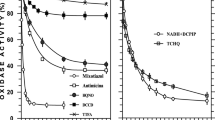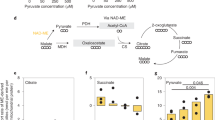Abstract
IT has been shown1 that freshly isolated pea root mitochondria oxidize α-oxoglutarate poorly or not at all if the oxygen uptake is measured by a polarographic method (in which the mitochondria are not shaken), and the oxygen uptake is not stimulated by diphosphopyridine nucleotide (oxidized form, DPN). However, if the mitochondria are first shaken for 30 min. in a water bath at 25°, they do oxidize α-oxoglutarate and DPN increases the rate of oxygen uptake (Table 1).
This is a preview of subscription content, access via your institution
Access options
Subscribe to this journal
Receive 51 print issues and online access
$199.00 per year
only $3.90 per issue
Buy this article
- Purchase on Springer Link
- Instant access to full article PDF
Prices may be subject to local taxes which are calculated during checkout
Similar content being viewed by others
References
Stickland, R. G., Biochem. J., 77, 636 (1960).
Birt, L. M., and Bartley, W., Biochem. J., 75, 303 (1960).
Arrigoni, O., G. Biochim., 8, 180 (1959).
Tager, J. M., and Rautanen, N., Biochim. biophys. Acta, 18, 111 (1955).
Author information
Authors and Affiliations
Rights and permissions
About this article
Cite this article
STICKLAND, R. Oxidation of Reduced Pyridine Nucleotides and of Sulphite by Pea Root Mitochondria. Nature 190, 648–649 (1961). https://doi.org/10.1038/190648a0
Issue Date:
DOI: https://doi.org/10.1038/190648a0
This article is cited by
Comments
By submitting a comment you agree to abide by our Terms and Community Guidelines. If you find something abusive or that does not comply with our terms or guidelines please flag it as inappropriate.



